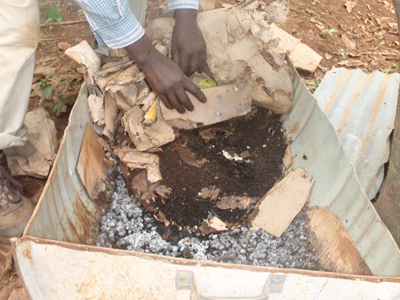It’s 10 o’clock in the morning and Caleb Omolo is walking around his farm and inspecting his crops. He stops at a nursery full of coffee trees and moves slowly toward a set of troughs in the shade of some mango trees. He bends and carefully removes the wet cardboard loosely covering one of the troughs.
With extra care, Mr. Omolo digs his fingers into the trough and slowly pulls out a warm, moist handful. Eight fat, brown earthworms wriggle in his hands.
The worms writhe back and forth, hanging loosely from Mr. Omolo’s fingers. He explains, “Two weeks ago, this sample you are seeing was mere pulps of coffee seeds. But as you see, this is something else.”
Mr. Omolo lives in the village of Kosodo in southwestern Kenya’s Migori County. He says earthworms help to break down the coffee pulps into soil-like matter, which he dries and then applies to his crops as organic fertilizer. He also applies the fertilizer when he plants coffee seedlings.
Mr. Omolo explains: “Earthworms are very good eaters and can consume five times their body size in food [each day]. That is how they eat all the organic materials and, in the process, they let out [excrete] this rich organic fertilizer.”
Mr. Omolo provides fruits and all sorts of other organic matter to the earthworms to make the organic fertilizer. The farmer mixes the organic matter with soil before providing it to the earthworms.
He says the earthworm fertilizer is rich in phosphorus, calcium, and other minerals that plants need.
 [1]
[1]
Mr. Omolo shows the trough where he makes organic manure.
Thadeus Ombego lives near Mr. Omolo. He learned how to use earthworms to compost organic matter from Mr. Omolo. Now he grows black nightshade, spider flower, and amaranth with organic fertilizer. When he doesn’t have enough compost, Mr. Ombego buys some from Mr. Omolo.
Callen Akech is another local farmer, and grows tomatoes and kale. She says that, for the past two years, the organic fertilizer and farmyard manure have helped her get higher yields.
William Ndirangu is the agricultural officer in Rongo sub-county. He says organic fertilizer has assured local farmers of good yields. Mr. Ndirangu also encourages farmers to use more farmyard manure.
He says farmers who practice organic agriculture produce more food. He explains, “This era of fast-changing climatic conditions requires a different approach in crop farming. In the past, farmers only relied on synthetic fertilizers for crop production.”
Mr. Ndirangu says many farmers in the region are quickly adopting Mr. Omolo’s technique in order to increase their yields.
In a month, Mr. Omolo’s worms produce about 500 kilograms of organic fertilizer. He uses part on his four-acre farm and sells the rest to other farmers.
These farmers are encouraging their fellow farmers to multiply earthworms because, according to Mr. Omolo, earthworms are hard to find in the area.
Mr. Omolo says the loss of earthworms is partly because of using pesticides and other chemicals on local soils, which kills earthworms. He adds, “About 50 years ago, earthworms were all over in this area.”
Mr. Omolo plans to continue multiplying earthworms to help increase the worm population and help him in his organic farming. He says, “I have the hope of making this land more habitable by earthworms because they are very important in farming.”